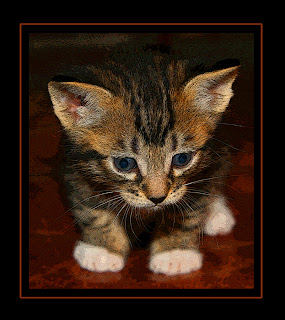
1. What time did you get up this morning? 7:30...reluctantly.
2. Diamonds or pearls? lapis....always need to be contrary (tho I prefer to be considered a salmon, just like to swim against the current :) Besides, did you know that diamonds are sometimes mined by slave children....too much guilt there.
3. What was the last film you saw at the cinema? Does anyone actually call it the cinema anymore...(sorry, see above disclaimer)...it was so long ago I can't remember.
4. What is your favorite TV show? House
5. What do you usually have for breakfast? Toast and coffee
6. What is your middle name? Elizabeth.
7. What food do you dislike? anchovies
8. What is your favorite CD? Just one? ...that's impossible.....today it's Caedmon's Call (but it'll change tomorrow)
9. What kind of car do you drive? Some sort of Van....I'll need to ask my daughter.
10. Favorite sandwich? BLT....yum!
11. What characteristic do you despise? delusional narcissistic cruelty....I'm not bitter
12. Favorite item of clothing? jeans/sweat shirt.
13. If you could go anywhere on vacation where would you go?
Ireland
14. What color is your bathroom? Purple, Caribbean blue and Lime green....it's a happy room!
15. Favorite brand of clothing? Brand???
16. Where do you want to retire? Home....or as far away from the mean people as we can afford to go....I'm not bitter.
17. What was your most recent memorable birthday? I'm not much for celebrations where I am the center of attention....so most of them are happily forgettable.
18. Favorite sport to watch? Baseball.
19. Furthest place you are sending this? Pennsylvania....Hi Mike and Naoko!
20. Who do you least expect to send this back? everybody....
21. Person you expect to send it back first? My sister and best friend, Julie.
22. Favorite sayings? I'm not bitter ....(having t-shirts made)
23. When is your birthday? I cannot divulge that information as it will compromise our agents in the field.
24. Are you a morning person or a night person? Morning people should be shot (does that answer your question?)
25. What is your shoe size? what a strange question.
26. Pets? 3 dogs, 11 cats (and counting)
27. Any new and exciting news you'd like to share with us? I'm seriously considering a run for the Presidency.
28. What did you want to be when you were little? A horse.
29. How are you today? Tired of fighting battles with the mentally ill.
30. What is your favorite candy? See's peanut crunch and California brittle.
31. What is your favorite flower? Daisys.
32. What is a day on the calendar you are looking forward to? Weekends, I love having Steve and the kids at home with me.
33. What church do you attend? Crossroads EV Free....tho attend might be too strong a word :)
34. What are you listening to right now? Wilson coughing.
35. What was the last thing you ate? Goodie, more guilt....a chocolate truffle.
36. Do you wish on stars? No, but you can't hardly see them around here.
37. If you were a crayon what color would you be? Chartreuse.
38. How is the weather right now? Rainy....yea!
39 Who was the last person you spoke to on the phone? A bill collector.
40. Do you like the person who sent this to you? Who sent this? Just kidding, Hi Sue (I actually love these things....I SO don't have a life:)
41. Favorite drink? Tea and lemonade (Arnold Palmer)
42. Favorite restaurant(s)?
Fugazzis43. Hair color? The one I was born with or the one I pay money for?
44. Favorite day of the year? Thanksgiving....all food, no presents and therefore, no guilt.
45. What was your favorite toy as a child? Electric train.
46. Summer or winter? Winter.
47. Hugs or kisses? Kisses...we are talking about the ones from Hershey correct?
48. Chocolate or Vanilla? Mint Chip....there's that salmon thing again.
49. Do you want your friends to email you back? Sure
50. When was the last time you cried? Last night.
51. What is under your bed? All kinds of crap.
52. Who is the friend you have had the longest? Julie, my sister, my best friend (see#21)
53. What did you do last night? Cried about mean people.
54. Favorite smell? Coffee.
55. What are you afraid of? My kids making mistakes that will cause them pain.
56. Plain, buttered, or salted Popcorn? Buttered & Salted
57. How many keys on your key ring? I have no idea...
58. How many years at your current job? Mom...21 years.
59. Favorite day of the week? depends on what I'm doing and who I'm doing it with.
60. How many towns have you lived in? I need to ask my Mom, maybe seven.
61. Do you make friends easily? No, I basically don't like people...I prefer ferrets.
62. How many people will you be sending this to? 3...see above.





















.jpeg)

























